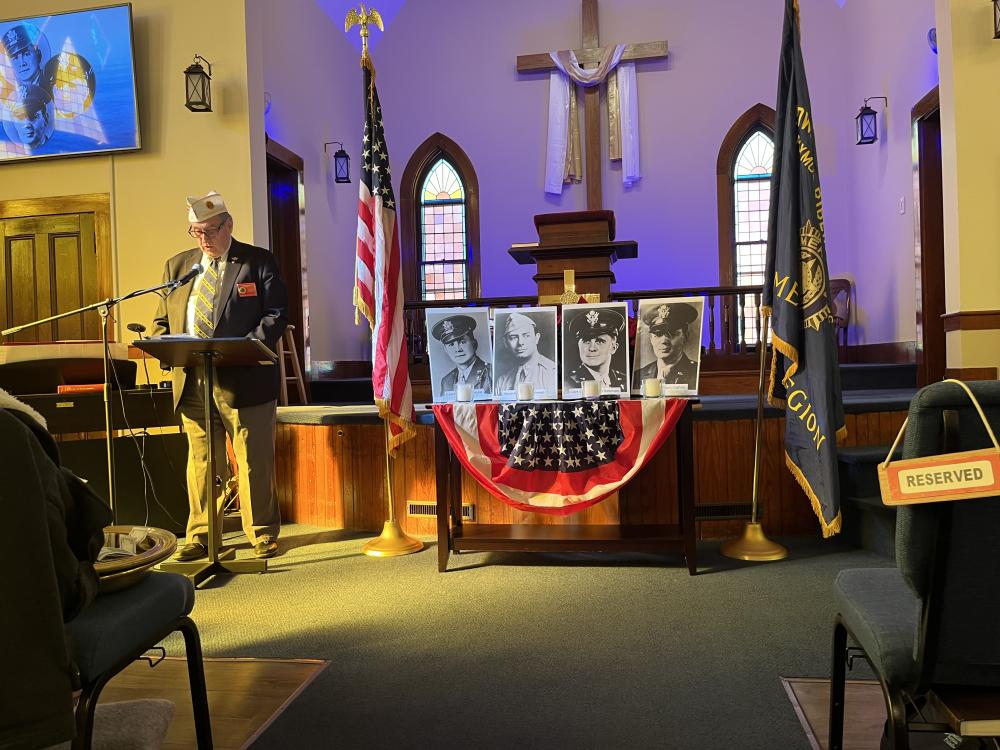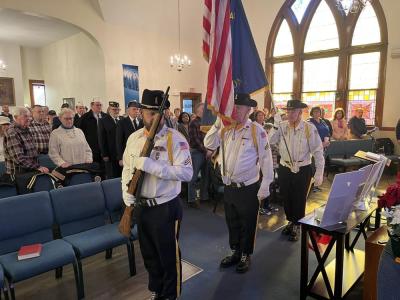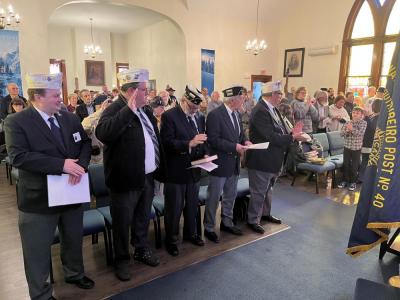Baptist church, American Legion remember four heroic chaplains
MIDDLEBORO — Eighty years after four chaplains went down with the USS Dorchester ship in the second-worst sea disaster of World War II, First Baptist Church of Middleboro congregants invited veterans to remember their legacies.
The congregation commemorated the chaplains during a Sunday, Feb. 5 service. The disaster happened on Feb. 3, 1943.
The four chaplains — Methodist minister George L. Fox, Jewish rabbi Alexander D. Goode, Dutch Reformed minister Clark V. Poling, and Catholic priest John P. Washington — spent some of their formative years together in Massachusetts. All four held the rank of first lieutenant at the time of their deaths.
They met in the Army Chaplains School at Harvard University, then reunited at Camp Myles Standish where they prepared to depart for Greenland aboard the Dorchester with American soldiers.
American Legion District 10 Vice Commander Bob Burke introduced the chaplains’ story with portraits of each of them next to him at the front of the congregation.
After the Dorchester was hit by a German submarine torpedo, surviving eyewitnesses reported hearing the chaplains “offering prayers to the dying and encouragement for those who would live,” Burke said.
In the face of disaster, the men put religion to the side to help as many soldiers as they could, Burke said.
“A ship’s engineer witnessed what, to him, was an astonishing sight,” Burke said. “When there were no more life jackets in storage, the chaplains unhesitatingly removed their own and gave them to four frightened young soldiers.”
American Legion members read biographies of each chaplain.
When World War II began, Fox decided to join the Army Chaplain Service in July of 1942 and went on active duty a month later, according to Dennis Olson. Six months into his second tour of duty, he was killed in action.
Goode applied to become an army chaplain after the Pearl Harbor disaster, said Jeffrey Montelo. He left behind a wife and four children when he went down with the Dorchester.
Poling decided to become a chaplain after the United States entered World War II.
“Talking with his father who had been a chaplain in World War I, he was told that chaplains in conflict had sustained the highest mortality rate of all military personnel,” said Paul Connell. “Without hesitation, he accepted appointment in June 1942 as a chaplain.”
Washington, like Goode, decided to become an army chaplain after Pearl Harbor. He had wanted to become a priest since the seventh grade, according to Nelson Blake.
Just 230 of the 902 men on the ship survived the attack.
“When the terrible news reached American shores, the nation was stunned by the magnitude of the tragedy and the heroic conduct of the four chaplains,” Burke said. “They were thought to have been ordinary men, but when the circumstances moved them, the four friends committed an extraordinary act that bound them together forever.”















